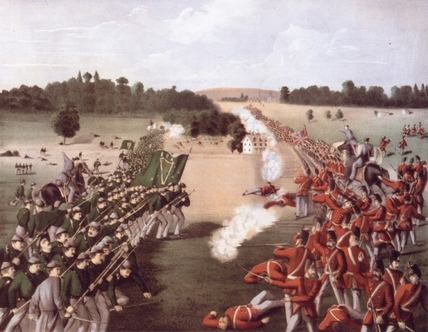 A scene from the 'Battle of Ridgeway', 1866 (US Library of Congress) A scene from the 'Battle of Ridgeway', 1866 (US Library of Congress) A two-day conference, literary evening, and associated events will be held over June 2-3, 2016, in Fort Erie, Ontario, Canada. This Conference, the first on this topic in Canada, will present a complete overview of the political climate on the Canada/US border in the 1860's through keynote speeches, panel discussions, and specialist information sessions. The presentations will focus on the events leading up to, and culminating in, the Battle of Ridgeway/Fort Erie June 2, 1866. The international group of presenters will include published authors and historians with expertise in the political, military, and social aspects of Canadian, Irish, and US history during the 1860's. The conference is intended to be a multidisciplinary event. The addresses and lectures will be augmented with art, music, and literature of the period. For more information, and to book tickets, see the official website. An estimated 200,000 Irish-born soldiers fought in the American Civil War (180,000 with the Union and 20,000 with the Confederacy). At the war's end there were tens of thousands of battle-hardened Irish veterans, as well as many officers from both the Union and Confederate armies. The Irish Republican Brotherhood, popularly known as the Fenians, had long hoped to utilise these soldiers for an incursion into Canadian territory that would be timed to coincide with a revolution in Ireland. Thus the British Empire would be engaged in two widely separated theatres of war. When it became apparent that the hoped-for rising in Ireland was not to happen during 1866 (a small-scale Irish rising would take place in 1867 but was defeated) the goal of the invasion was changed. The Fenians now hoped that they could engineer a border incident that would entangle British forces in a war with the United States. Consequently, the years 1866, 1870, and 1871, witnessed the various 'Fenian Raids' on Canada and we will discuss these events in a later post. John Boyle O'Reilly was a prisoner in Ireland during the 1866 raids, having been arrested in February of that year. O'Reilly, a soldier in the British army's 10th Hussars, had been secretly recruiting soldiers into the Irish Republican Brotherhood in advance of the planned Irish rising. When O'Reilly arrived in the USA in 1869, following his escape from an Australian penal colony, he would come to know many of the leaders and individuals who were active in 1866 and he would play an important role in the subsequent Fenian raid in 1870. His life-story, spanning both sides of the Atlantic, provides a means through which to untangle and better understand a period when Irish nationalists would seek to defeat the British Empire, not only in Ireland but also in what was to become modern Canada. Through studying O'Reilly and others, we can see how the histories of Ireland, Canada, the British Empire, and the United States overlapped and resulted in the extraordinary events that were the 'Fenian raids'. Comments are closed.
|
Ian Kenneally
Short articles about the life and times of John Boyle O'Reilly. Archives
March 2020
Categories
All
|